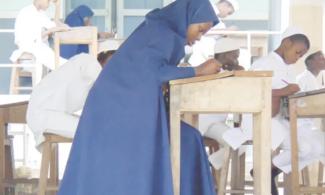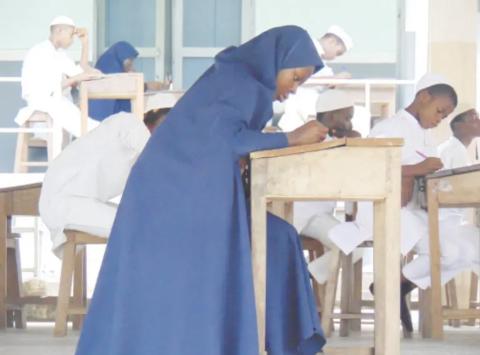
Some of the Muslims lamented that their people label them as Hausa and they refused to understand their freedom of religion.
Many Igbo Muslims in the South-East states are now fleeing up north due to the growing resentment against the Hausa/Fulani community and the Federal Government in the region, coupled with the security crisis.
According to Daily Trust’s investigation, some of the Muslims lamented that their people label them as Hausa and they refused to understand their freedom of religion.

The victims added that the majority of the South-Easterners refused to understand that “we are Igbos, before becoming Muslims.”
Recent happenings including secession agitations and activities of members of the Indigenous People of Biafra have also made life very tough for the minority Igbo Muslims in the South-East.
Findings revealed that there are Igbo Muslims in Abia, Anambra, Ebonyi, Enugu and Imo states. However, the total number of those that relocated to the North to find succour and practise their religion without molestation far outweighs the total number of those still living in the entire South-East.
Some of the victims likened their travails to “apartheid” as they are being marginalised in the scheme of things.
Muslim women interviewed in Afikpo, Ebonyi state, as well as Enugu, Abakaliki, Umuahia, Okigwe and Owerri, are called derogatory names such as ‘masquerade’, ‘traitor’ and ‘Hausa’, when they appear in public wearing their hijabs.
Halima Musa Ani in Enugu recalls a public attack she suffered last year when she joined a queue, and an attempt was made to remove the hijab which she was wearing.
On many occasions Muslim women have been referred to as ‘Boko Haram’ and ‘slave’ when they make use of public transport, as revealed in Afikpo.
Halima recounted many personal experiences and those of others in which they were maltreated or given unfair treatment because of their religious identity.
“Igbo Muslims are facing many challenges in the South-East, even in the streets, especially the women, because we cannot go out without our hijab. When you go out, you will be addressed as ‘Hausa.’ Even a small child will call you ‘Hausa, ’and begin to chant ‘Hausas are passing. Hausas are passing.’ It’s just like a song,” She said.
She said while she and others like her were categorised as Hausas and denied basic citizens’ rights, they are also not considered as the same by the Hausas. “When we go to the Hausas, they will describe us with an unfair word, and say ‘you are not part of us,” she said.
Last year, she joined a queue at the Enugu south local government secretariat to receive a palliative but when she was called to receive her ration, there was protest.
“One woman asked ‘why did you bring this Hausa woman. What brought her here?’ They were saying that I am claiming to be Igbo to get a N20,000 palliative. That I am not Igbo, and that I should go back to my state. Somebody grabbed my hijab from the back, and another woman joined, holding onto the hijab as well. I held onto my hijab,” Halima recalled.
Umar Musa Ani told the reporter that a young Muslim woman in Enugu will change her name from Aisha to Asisko, or from Maryam to Mary Anne, because of pressures from society. In a new twist to Hausa phobia, Igbo Muslims are accused by Igbo Christians of becoming Muslims because they wish to gain material wealth from Hausa Muslims.
Igbo Muslims lament their lack of visibility nationally. There are no members of the National Assembly who hail from the Igbo Muslim community. No minister or minister of state is an Igbo Muslim. The only commissioner in the region, who is a Muslim, is Suleiman Ukandu, the commissioner for lands, survey and urban planning in Abia State.
Sheikh Haroun Ajah, Vice President General, Nigeria Supreme Council for Islamic Affairs, interviewed in Abakaliki, Ebonyi State, provides a background.
“Muslims don’t have access to the civil service. We don’t have access to political appointments, no access to anything that is being done by the government. If it were possible for us to be denied our daily bread, they would do that,” he said.
Ajah, while stating that there are more Igbo Muslims in the north than in the entire South-East, also sheds light on a growing Hausa phobia.
“When they see an Igbo Muslim, they label him Hausa. They refuse to understand that Hausa is a tribe, Igbo is a tribe and Islam is a means of spiritual relationship with the Almighty. They refuse to understand that we are Igbos, before becoming Muslims.”
On account of years of marginalisation, profiling and exclusion, he thinks that the Federal Government should compensate Igbo Muslims but did not specify the form this may take.
The fear of lynching, expulsion and death has also pushed some fresh converts to Islam to practice Islam in the secret.
Suleiman Njoku, Chief Imam of Imo state, argues: “There are some secret Muslims in Imo State. Because of persecution, some of them have been hiding their identity. I noticed this when I became the Imam.”